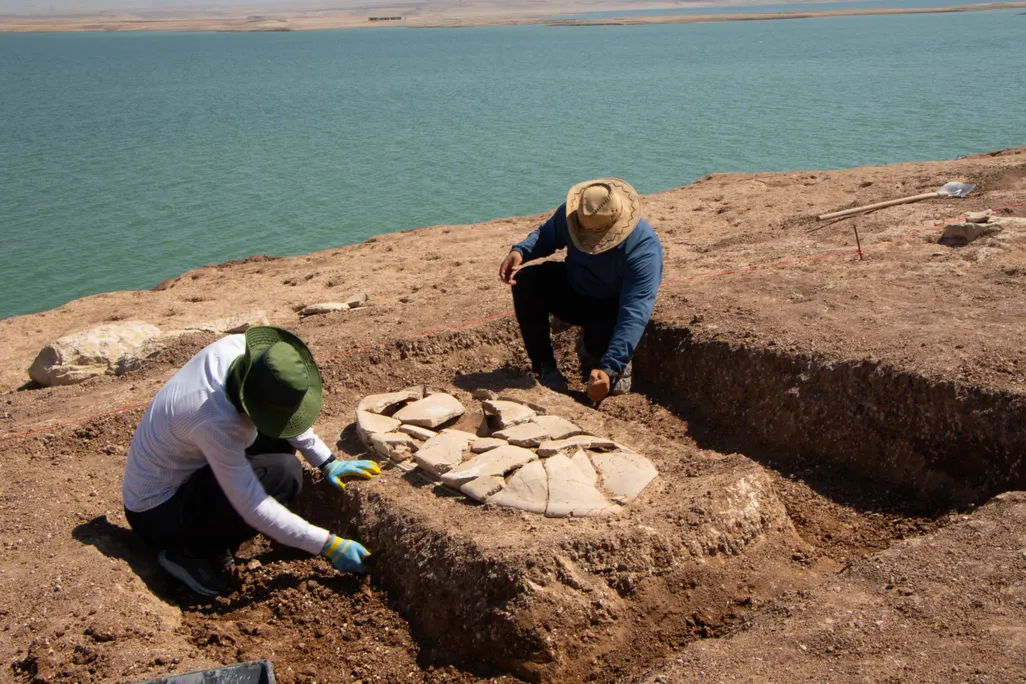The tombs, which likely date to Iraq’s Hellenistic period, were discovered along the Mosul Dam reservoir
Ella Feldman - Daily Correspondent
September 17, 2025 9:55 a.m.

Archaeologists have discovered 40 tombs in Iraq after severe droughts lowered water levels in the country’s largest reservoir, Agence France-Presse (AFP) reports.
The tombs were discovered along the Mosul Dam reservoir in the Duhok province in northern Iraq. They are thought to be more than 2,300 years old, likely from the Hellenistic period, when Iraq was under the rule of the Seleucid empire.
Quick fact: The reach of the Seleucid empire
At its peak, the empire stretched from what is now Turkey to the edges of India.
A team of archaeologists had surveyed the same area in 2023, also when water levels were low. However, they only spotted parts of the tombs.
This time, conditions were different. Iraq is in the midst of one of its driest years on record in nearly a century, according to Al Jazeera. Severe water shortages are threatening the country’s health and safety as water reserves have dwindled to just 8 percent of their full capacity.
When water levels in the Mosul Dam reservoir dropped “to their lowest,” archaeologists were able to return and access the tombs, Bekas Brefkany, leader of the site’s archaeological work, tells AFP.
“While the receding waters have had negative impacts, for us as archaeologists, they have also provided an opportunity to rediscover areas that had long been hidden underwater,” Brefkany explains to the Art Newspaper’s Hadani Ditmars.
Brefkany and his team are racing to excavate the tombs before the dam is flooded again. They’ll be transferred to the Duhok Museum for study and preservation. As Brefkany tells the Art Newspaper, he hopes that researchers will eventually be able to “shed more light on causes of death, family ties and the broader social context of these burials.”
/https://tf-cmsv2-smithsonianmag-media.s3.amazonaws.com/filer_public/7e/5e/7e5e058c-758f-470e-9241-a1a485b4efd9/gettyimages-2232157561.jpg) Ancient graves unearthed by members of the Dohuk Antiquities Department on the banks of Mosul Dam
Ismael Adnan / AFP
Ancient graves unearthed by members of the Dohuk Antiquities Department on the banks of Mosul Dam
Ismael Adnan / AFP
Iraq has contended with numerous droughts in recent years, leading to archaeological discoveries across the country. In 2022, ruins of a 3,400-year-old city were found in a dried-up section of the Mosul Dam along the Tigris River.
They have also brought regions of the country to the brink of humanitarian disaster, which experts warn will worsen if the government doesn’t intervene, per Al Jazeera. According to the United Nations, Iraq is one of the countries “most vulnerable to the impact of climate change” due to rising temperatures, frequent sand and dust storms, and water scarcity.
As water levels continue to drop, the archaeologists expect to unearth more artifacts, Nazim Zibari, an archaeologist at the site, tells AFP.
“This work that we are doing now is very difficult, complex and it takes time,” Zibari says.
Earlier this year, archaeologists found a rare stone relief among the ruins of ancient Assyrian metropolis Nineveh in Mosul, a city in northern Iraq. The artifact depicts important deities alongside Ashurbanipal, the last great king of the Assyrian empire.
.png)

.png)


